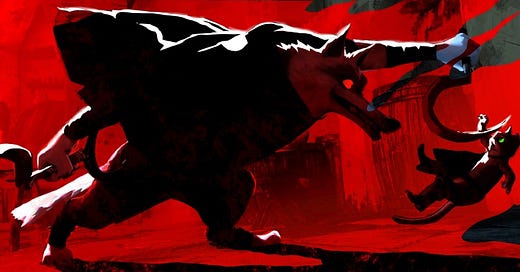Of all the various kitschy things that Disneyland’s Tomorrowland guessed wrong about the future, by far the most disorienting for an actual park visitor is that they thought there would still be water fountains. Even the most celebrated imaginations of the mid-twentieth century, straining to picture the world unfolding in front of us, couldn’t conceive of bottled water.
Similarly, of all the outdated themes and metanarratives to be found consistently in their classic animated features, the most difficult one to square with the Disney of today is the one that says: as difficult and bittersweet as it feels, every child must one day become an adult.
It’s counterintuitive and contrary to a business model based on selling theme park tickets and streaming services from cradle to grave, but it’s true. Paradoxically — but like the popular fairy tales upon which they often drew — Disney movies created some of the most iconic images and memories of childhood while gently nudging their audience towards its sunset. Long before the primary Disney narrative became ‘transform your family/social group through self-discovery and self-realization’ (Ratatouille, Zootopia, Encanto), it was ‘here are the ways you will need to grow to become what your family/social group needs’ (Bambi, The Jungle Book, Pinocchio).
When the Shrek extended universe had its genesis in 2001, the picture was little more than a feature-length anti-Disney parody. The unsubtly-named Lord Farquaad was infamously modelled to look like longtime on-again, off-again Disney CEO Michael Eisner, and the story world’s remit was all of European nursery rhyme and fairy tale.
So maybe it’s appropriate that the latest instalment in the franchise — Puss In Boots: The Last Wish — should take a format, the animated feature, that has been reduced entirely to self-affirmation, and made it instead about the fact that death is coming for us all.
Puss in Boots (Antonio Banderas) begins his story from the place where most animated protagonists end theirs: absolute self-realization. As his song goes, he is not only a “fearless hero,” but your “favourite” one. He travels from town to town basking (and by the look of some of these towns, possibly Basque-ing) in the adulation of anonymous, adoring strangers, on whose behalf he occasionally effects a stirring and stupendous act of bravery.
Puss is brave because he “laughs at Death.” But we soon discovery that his is a counterfeit bravery, born of thoughtlessness: he has 9 lives, so Death is forever forestalled. Or at least it was, until he carelessly loses life #8 by indulging in an encore of his theme song. Through flashback, we learn that he was similarly profligate with all of his lives, each of which was lost in some stupid act of hubris or bravado.
In the face of this mortal nonchalance, Death — in the guise of a sickle-wielding Wolf (Wagner Moura, who brings all the chilling terror of his Pablo Escobar to this cartoon anthropomorphism) — has decided not to wait for Puss to toss his ninth life away, but instead to take it himself.
And now, Puss in Boots feels terror.
This is what the existentialist theologian Paul Tillich called “the shock of non-being.” Tillich’s longtime student, Langdon Gilkey, would go on to write that the polarity between being and non-being was even more central to Tillich’s system, and his conception of God, than maybe he even realized. This is something of Heidegger’s existentialism in Tillich’s worldview (despite the former’s capitulation to and collaboration with Nazism, and the latter’s early, vocal, and ongoing anti-Nazism): that without finitude, our being would have no meaning. There would be no anxiety, because there would be no choice.
Tillich’s most famous and well-read work was The Courage to Be, in which he brought before a wider audience the concept of “the God above the God of theism” — this was, famously, God not as a being, but as the divine Ground of Being. As ultimate reality, God grounds both being and non-being, containing (and therefore overpowering) his own negation. This was also Tillich’s sense of the meaning of the Cross and Resurrection. Therefore, we finite creatures who have been shocked, and terrified, by the threat of non-being find the courage to be in the fact of our being rooted in a divine ultimacy that is big enough to be the ground of its own cancelling-out:
[T]he self-creativity of life, when it fully realizes itself, becomes as well the self-giving of life. The reason is that only the symbol that is willing to negate itself is able to remain in unbroken unity with its ground and so able to point beyond itself. Through death, or at least only through the willingness to die, is there life. [Gilkey, Gilkey on Tillich, page 112]
With his friends Kitty Softpaws (Salma Hayek) and an unnamed orphan dog (Harvey Guillén), Puss sets out in search of a wishing star, in the hopes of retrieving his lost lives — with the overriding aim of outrunning Death.
But faced repeatedly with the consequences of his own selfishness and frailty, of his own (to borrow a Tillichian term) estrangement, Puss’s initial shock of non-being begins instead to offer the possibility of the courage to be.
Oh, and it’s also very funny.
Puss In Boots: The Last Wish is rated PG, which is just as well — for once, here’s a cartoon that really does deserve to be seen by kids of all ages.




